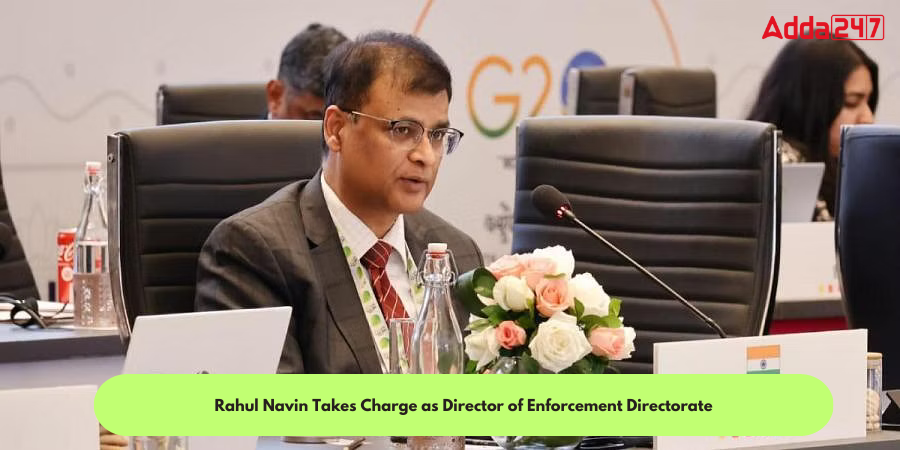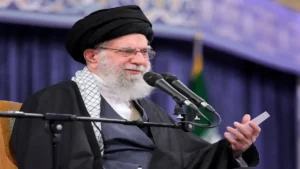IRS (Indian Revenue Service) officer Rahul Navin assumed the role of In-Charge Director of the Enforcement Directorate (ED), succeeding the outgoing Director Sanjay Kumar Mishra. This transition marks an important development in the leadership of the ED, a crucial agency responsible for enforcing economic laws and regulations in India. Mr. Navin is currently serving as the Special Director of the Enforcement Directorate.
The official order further stated that the tenure of Sanjay Kumar Mishra as the Director of Enforcement in the Enforcement Directorate concluded on the 15th of September, 2023. This event follows a series of legal developments and extensions that ultimately led to the conclusion of Mr. Mishra’s tenure. Sanjay Kumar Mishra was initially appointed as the Director of the Enforcement Directorate for a two-year term on November 19, 2018. Later, in a significant development, the Central government modified the appointment letter retrospectively through an order dated November 13, 2020. This modification extended his term from two years to three years.
Rahul Navin’s Appointment
According to an official order, Rahul Navin, a distinguished IRS officer from the 1993 batch, has been appointed as the In-Charge Director. He will hold this position until the appointment of a regular Director or until further orders are issued.
What is Enforcement Directorate (ED)?
The Enforcement Directorate (ED) is a specialized law enforcement agency in India responsible for enforcing economic laws and regulations in the country. It is primarily tasked with investigating and prosecuting cases related to financial crimes, money laundering, foreign exchange violations, and economic offenses.
Here are some key functions and responsibilities of the Enforcement Directorate:
- Prevention of Money Laundering: One of the primary functions of the ED is to investigate and prosecute cases of money laundering. Money laundering involves concealing the origins of illegally obtained money, typically by transferring it through a complex sequence of banking transfers or commercial transactions. The ED takes action against individuals and entities involved in money laundering activities.
- Foreign Exchange Management Act (FEMA) Violations: The Enforcement Directorate enforces the provisions of the Foreign Exchange Management Act, which regulates foreign exchange transactions and transactions involving foreign exchange assets. It investigates cases of foreign exchange violations and ensures compliance with FEMA regulations.
- Probing Economic Offenses: The ED investigates various economic offenses, including fraud, financial scams, tax evasion, and corruption cases that have financial implications. It plays a crucial role in ensuring accountability and transparency in economic activities.
- Confiscation of Proceeds of Crime: The agency has the authority to attach and confiscate assets and properties acquired through illegal means or derived from the proceeds of crime. This is done to prevent individuals or entities from benefiting from their unlawful activities.
- International Cooperation: The ED collaborates with international law enforcement agencies and financial intelligence units to combat transnational economic crimes. It participates in mutual legal assistance treaties (MLATs) and shares information and evidence with foreign counterparts to address cross-border financial crimes.
- Prosecution: After conducting investigations, the ED initiates legal proceedings and prosecutions against individuals and entities found guilty of economic offenses. It presents cases before specialized adjudicating authorities and courts.
- Preventive Measures: In addition to investigations and prosecutions, the ED also takes preventive measures to curb financial crimes. This includes issuing show-cause notices, conducting inquiries, and attaching properties as a precautionary measure during ongoing investigations.
- Adjudication: The agency is responsible for adjudicating cases related to violations of foreign exchange and money laundering laws. It has its own adjudicating authorities to hear such cases.
The Enforcement Directorate operates under the administrative control of the Department of Revenue, which, in turn, is part of the Ministry of Finance, Government of India. It plays a critical role in maintaining the integrity of India’s financial and economic systems by ensuring compliance with laws and regulations related to economic activities.
Important takeaways for all competitive exams:
- Enforcement Directorate Founded: 1 May 1956;
- Enforcement Directorate Headquarters: New Delhi, India.




 Iran’s Supreme Leader Ayatollah Ali Kham...
Iran’s Supreme Leader Ayatollah Ali Kham...
 Which Country Officially Uses Two Differ...
Which Country Officially Uses Two Differ...
 Historic Glory! Jammu & Kashmir Win ...
Historic Glory! Jammu & Kashmir Win ...








